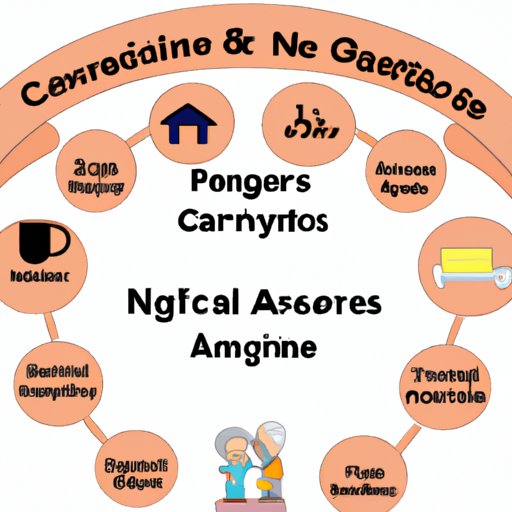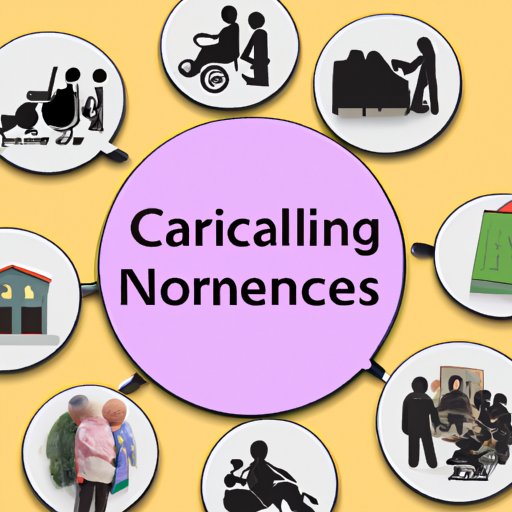Introduction
Nursing home care is a type of long-term care that is provided to individuals who require assistance with activities of daily living due to physical or cognitive impairments. In order to qualify for nursing home care, individuals must meet certain medical and financial requirements, and there are various costs associated with this form of care. This article provides an overview of the criteria, costs, and services associated with qualifying for nursing home care, as well as the role of family members in the decision-making process and the advantages and disadvantages of nursing home care.

Criteria for Nursing Home Care Eligibility
In order to be eligible for nursing home care, individuals must meet both medical and financial requirements.
Medical Requirements
The most important criterion for eligibility for nursing home care is the need for assistance with activities of daily living. Individuals must demonstrate a need for 24-hour nursing care, which may include help with bathing, dressing, eating, mobility, and other activities. Additionally, individuals must have a medical condition that requires professional nursing care or rehabilitation services.
Financial Requirements
In addition to meeting medical requirements, individuals must also meet certain financial requirements in order to qualify for nursing home care. Generally, individuals must have assets of less than a certain amount in order to be eligible for Medicaid coverage, which is the primary source of payment for nursing home care. Additionally, individuals must demonstrate a need for nursing home care based on their income and expenses.

Financial Implications of Nursing Home Care
There are various costs associated with nursing home care, and these costs vary depending on the type of facility and level of care needed. Generally, nursing home care can cost thousands of dollars per month. However, some individuals may qualify for Medicaid coverage, which can cover the majority of the cost of care. Additionally, there are other payment options available, such as private insurance, veterans’ benefits, and long-term care insurance.
Types of Services Provided in a Nursing Home
Nursing homes provide a variety of services to meet the needs of their residents. These services typically include health care services, social and recreational activities, and assistance with activities of daily living. Health care services may include medical treatments, medications, and therapy. Social and recreational activities may include games, movies, and outings. Assistance with activities of daily living may include help with bathing, dressing, eating, mobility, and other activities.
Role of Family Members in the Decision-Making Process
Family members play an important role in the decision-making process when it comes to nursing home care. They can be involved in assessing eligibility for nursing home care and making decisions about the type of care needed. They can also provide emotional support to the individual receiving care and assist with coordination of care.

Advantages and Disadvantages of Nursing Home Care
Nursing home care has both advantages and disadvantages. On the one hand, it can provide individuals with access to medical and rehabilitative services, as well as social and recreational activities. Additionally, it can provide individuals with assistance with activities of daily living, which can allow them to maintain their independence. On the other hand, nursing home care can be expensive, and there are risks associated with living in a nursing home, such as the potential for abuse or neglect.
Laws and Regulations Governing Nursing Home Care
Nursing home care is regulated at both the state and federal level. At the state level, laws and regulations governing nursing homes are established by each state’s department of health. At the federal level, the Centers for Medicare and Medicaid Services (CMS) sets standards for nursing homes that receive funding from the federal government.
Conclusion
Nursing home care is a type of long-term care that is provided to individuals who require assistance with activities of daily living due to physical or cognitive impairments. In order to qualify for nursing home care, individuals must meet both medical and financial requirements. Additionally, there are various costs associated with nursing home care, as well as a variety of services provided in a nursing home. Family members play an important role in the decision-making process when it comes to nursing home care, and there are both advantages and disadvantages to this form of care. Finally, nursing home care is regulated at both the state and federal level.
In conclusion, it is important to understand the criteria, costs, and services associated with qualifying for nursing home care. Additionally, it is important to consider the role of family members in the decision-making process, as well as the advantages and disadvantages of nursing home care.
(Note: Is this article not meeting your expectations? Do you have knowledge or insights to share? Unlock new opportunities and expand your reach by joining our authors team. Click Registration to join us and share your expertise with our readers.)
